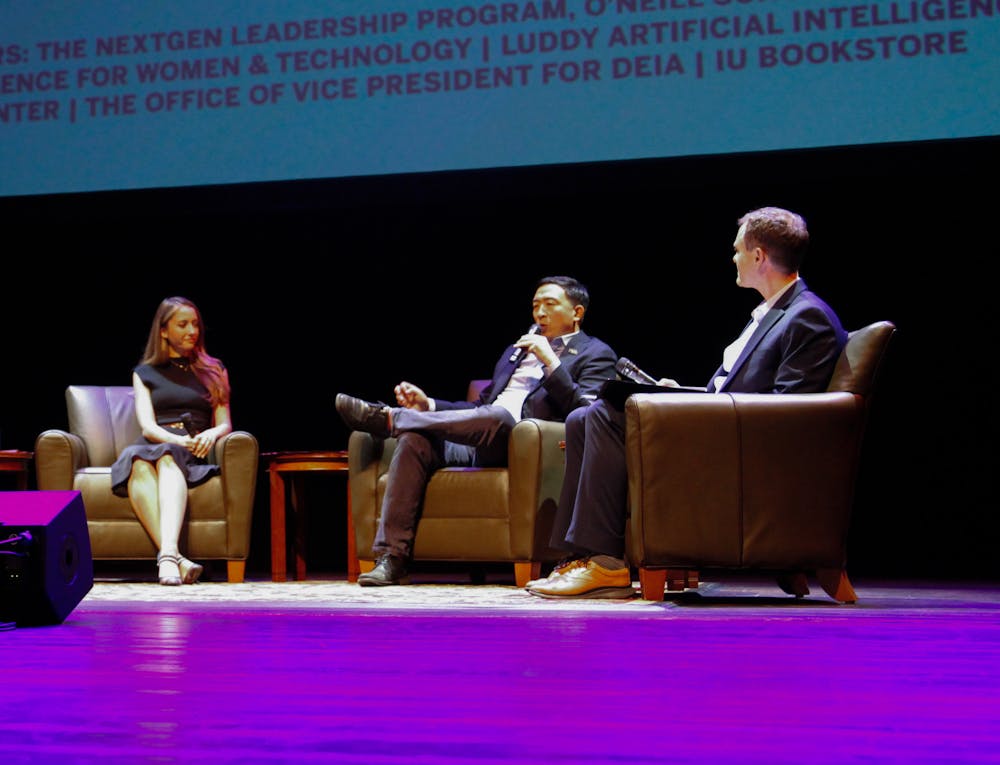The IU Union Board hosted a panel with former U.S. presidential candidate Andrew Yang and AI artist Taryn Southern on Thursday night at the IU Auditorium.
The event was a part of the Union Board’s Mervis Distinguished Lecture Series to honor IU alum Lou Mervis. These lectures aim to spark curiosity and encourage the people who attend them to make the world a better place, according to the pamphlets handed out at the event. This event was free for IU students and $25 for IU faculty, staff and the public.
Yang ran for U.S. president in 2020 and New York City mayor in 2021, losing both elections. Yang is also a bestselling author, podcaster, entrepreneur, philanthropist and founder of the Forward Party — a political party designed to empower local leaders to find policy solutions that work in their communities, according to its website.
Southern is an AI-pop musical artist, filmmaker and entrepreneur. She created “I AM AI” which was the first album by a solo artist composed and produced by artificial intelligence. Southern also co-directed a documentary “I AM HUMAN” which premiered at the Tribeca Film Festival in 2019.
The event began with a video presentation about Lou Mervis, his time at IU and his accomplishments after he graduated. Shubhi Sinha, lead intern at the IU Center of Excellence for Women and Technology, thanked the sponsors of the event and the Mervis family. Sinha then introduced Yang and Southern to the audience.
The panel was moderated by, Brayton Rose, the Union Board director of lectures, and David Crandall, director of the Luddy Artificial Intelligence Center, The panel began with Rose, who is also an IU student, providing a student perspective on the changes in artificial intelligence over the last few years.
“We have seen major changes to the rules and the expectations of us to adapt to generative AI in our coursework and to expect implications in our potential careers,” Rose said.
The conversation started with Yang and Southern talking about the positive aspects of artificial intelligence. Southern discussed how artificial intelligence helped her create the “I AM AI” album.
“Normally I work with a human producer, but when working with AI I was able to give the AI certain parameters such as the instrumentation I want in the song, the type of style the song it is or, in some cases, I could actually ingest data for the AI to learn from,” Southern said.
Yang said some of the best work he is seeing with artificial intelligence has been in bioinformatics and drug discoveries. He said people will see some lifesaving breakthroughs in the future.
“I have friends in that industry who are just over the moon about how much they are going to be able to increase the output, which is great,” Yang said. “If you can do something like address ALS or Alzheimer's that’s amazing because AI does have the potential to improve the human condition.”
The panel then shifted to discuss the future of artificial intelligence. Southern discussed the potential of testing implantable neurotechnology on humans. She said in these tests, artificial intelligence decodes the patient’s thought and that information is then fed into a digital device.
“A patient who is paralyzed for instance might think about moving their arm and hand, that information is then translated into the digital device so now they can operate a robotic arm as if it was their own arm and hand,” Southern said.
Yang said artificial intelligence is an opportunity to make people’s lives easier, but it depends on how it is used.
“AI is going to get stronger, faster and more powerful, but the real question is if humans will evolve and advance with it,” Yang said.
The panel ended with Yang and Southern giving advice to students about their lives after college. Yang urged the people who were passionate about artificial intelligence to find and connect with someone in the field.
“I was around a couple of entrepreneurs when I was young, and I just thought ‘I want to be that person,’” Yang said. “It was not a quick road, but it has led to things that college-age me would never have fathomed ever being possible.”
Southern said having a growth mindset is an important quality that will keep young people going when starting their careers.
“Most people give up after their first fail,” Southern said. “The people who stick it out, it is really amazing where they end up going.”
People can find more information on upcoming IU Union Board lectures here.



